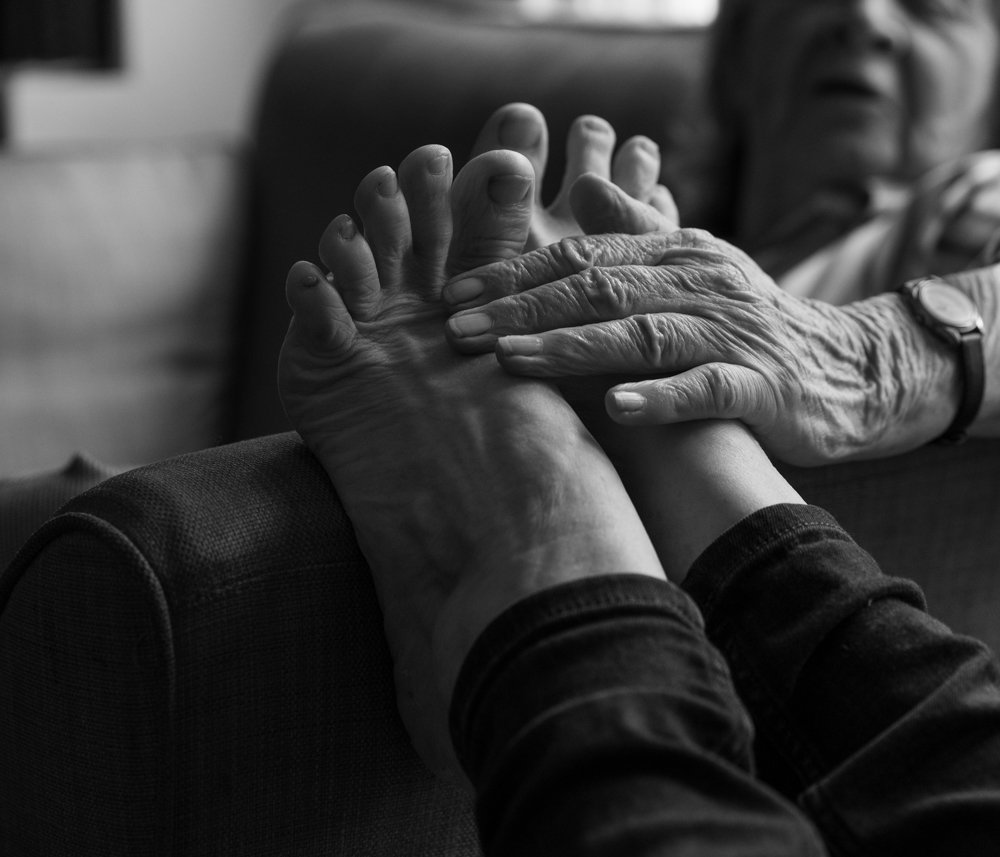Poignant Pics no.67: On Two Images By Kate Carpenter
Welcome to no. 67 in our series Poignant Pics, where our editor, Diana Nicholette Jeon, writes about two images by Kate Carpenter
“Snapshots remember—when you forget.”—Eastman Kodak advertisement, Life Magazine, Dec. 18, 1950.
A few months back, Andy Adams of Flak was trying to gather more photographers as a community on Twitter. I had been on Twitter since around 2009; I mainly used it for national politics and local news. I knew a couple of photographers there, but it wasn't until Andy called attention to it that I started thinking about the photo community on Twitter. That is how I met Kate Carpenter.
After Carpenter's work passed through my feed, I looked at her website. I found these images there, and I felt her emotion come through them. I want to call them 'poignant,' but it feels hokey to repeat the feature's title in speaking about the work. Yet, Mirriam Webster says:
poi·gnant | \ ˈpȯi-nyənt , sometimes ˈpȯi(g)-nənt \
Definition of poignant 1a(1): painfully affecting the feelings : PIERCING (2): deeply affecting : TOUCHING b: designed to make an impression : CUTTING poignant satire 2a: pleasurably stimulating b: being to the point : APT. 3: pungently pervasivea poignant perfume
and so 'poignant' it is. I feel the tenderness tinged with sadness.
Photographs and photography are a massive part of Carpenter's family story. Her family has been involved with photography since the 1930s; her mother, father, uncle, and grandfather were photographers. These images are from a series where Carpenter explored family stories, especially those related to the fallibility of memory and the fragility of the brain. She once thought she would tell this story in writing, but it seemed more fitting to make images given the family's ties to photography.
Her focus on the fragility of memory is also rooted in family history. Her mother and aunt both have dementia, as did their mother, and there is a belief that it affected generations before them.
She told me, "In making these images of happy moments in the house, I'm helping myself to tell a story – the story that I want to remember. To make sure that I remember the happy moments, the positive ones, and not just the difficulties and the darkness. I'm aware it's only one version, mine, but I need to hang on to it, as do they. These two images form part of my series, What Ceremony Else. It's about time, memory, family—the shadows and light through the generations."
(Clicking the thumbnails will bring up a lightbox.)
Here is what Kate told me about the individual images:
“March 2020 upended my world. I faced the sudden death of my father, my mother's newly diagnosed dementia, and the continuing cognitive decline of my aunt, all amidst the constraints imposed by the pandemic lockdown. My photography began to reflect my multiple roles. Using it, I looked for calm, the eye of the storm, order in the chaos, and light in the shadows.
Sisters - There are eleven years between my mother and her older sister. They never expected to be living together, especially not with different forms of dementia. We are glad that they have each other, though it isn't always easy. They have a strong sense of the disease being passed generationally, as their mother also had dementia. When their mother died, she had been living with my family due to her Alzheimer's. She went out for a walk and met with an accident on the railway. Now, my mother feels a strong sense of responsibility toward her older sister. "I won't have another one die on my watch." Here my mother is tending to her sister's sore feet after a day of gardening.
Remembering You - In this picture, my aunt is looking at a photograph of her mother. I once showed my aunt a photo of her uncle and aunt, who cared for her when she was a wartime evacuee. "Oh bloody hell," she said, "They were hard people. I don't want to look at that photograph." You can't just assume that reminiscence is always good for people with dementia. You can't talk through residual trauma or distress as your conversations will be forgotten. All that remains is the emotion prompted by the sight of the photograph.”
I enjoyed this sensitive work about such a troublesome ailment. It isn't always easy to relive our some of our life experiences via our work. Bravo, Kate!
Artist Bio
Kate’s photographer parents brought her up with a love of photography; her childhood memories of dark rooms, red lights, and chemical smells have not faded. She studied English and Modern Languages at Oxford University, and trained as a teacher at Cambridge. She has taught in schools and colleges in the UK, Germany and Belgium. Kate later undertook a Masters in Education and a Law degree, before spending several years as an advice centre volunteer.
Unable to ignore the pull of photography any longer, and wishing to bring all her interests together under an artistic umbrella, Kate is currently studying for a Master of Arts in Photography at Falmouth University. She is particularly interested in landscape, emotion, and memory.
Kate’s work has been exhibited in the UK and the USA and has featured in various print and online publications. You can find more of her work at her website.
Author Bio
Diana Nicholette Jeon is an award-winning artist based in Honolulu, HI, who works primarily with lens-based media. Her work has been seen both internationally and nationally in solo and group exhibitions. Jeon holds an MFA from UMBC.


